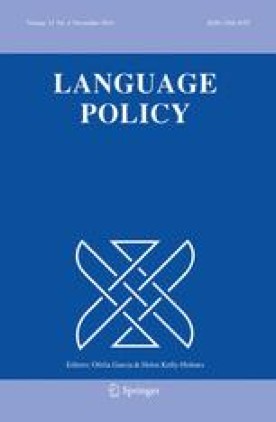- 充值
- 帮助

Language Policy is committed to building a sound theoretical understanding of the field through the publication of high-quality empirically driven research that covers a range of cases, situations, and regions worldwide. The journal aims to examine policymaking processes and practices by governments and governmental agencies, non-governmental organizations, business enterprises, public and private institutions, community organizations, families, and other entities. It also pays attention to attempts made by minoritized groups to develop, establish, contest, disrupt, resist, appropriate or modify language (education) policies or institutional regimes of knowledge about legitimate language and speakerhood. We encourage detailed accounts of the enactment, implementation, development, and effects of specific language policies and regimes of knowledge about language practices and speakers under historical and political economic conditions. Rather than just description and/or evaluation of policies, Language Policy seeks high-quality research that allows us to understand ongoing processes of social change, has a substantial theoretical underpinning and contributes to theory-building. Provides empirical accounts of language policy practices and processes involving the local enactment, implementation, development, and effects of specific language policies and regimes of knowledge about language practices and speakers vis-a-vis larger historical and political economic conditions; and Examines technologies of governmentality and forms of language policing which enable the daily regulation of communicative practices and speakers across a wide range of social domains, with a focus on the consequences for social groups’ unequal access to spaces and various material and symbolic resources; Helps build a sound theoretical understanding of issues in language policy and language education policy with regard to a wide range of cases, situations, and regions; Seeks researchers’ vigilance in unsettling the epistemic traces of long-standing projects of capitalism, colonialism and white supremacy in their own work.
- 主办单位: SPRINGER
- 出版地区: Netherlands
- 出版周期: 季刊
- 国际标准连续出版物号: ISSN 1568-4555
- 创刊时间: 2002年
期刊信息
- 主管单位:--
- 主办单位:SPRINGER
- 主 编:--
- 地 址:Netherlands
- 邮政编码:--
- 电子邮件:--
- 邮发代号:--
- 单 价:--
- 电 话:--

期刊简介
Language Policy is committed to building a sound theoretical understanding of the field through the publication of high-quality empirically driven research that covers a range of cases, situations, and regions worldwide. The journal aims to examine policymaking processes and practices by governments and governmental agencies, non-governmental organizations, business enterprises, public and private institutions, community organizations, families, and other entities. It also pays attention to attempts made by minoritized groups to develop, establish, contest, disrupt, resist, appropriate or modify language (education) policies or institutional regimes of knowledge about legitimate language and speakerhood. We encourage detailed accounts of the enactment, implementation, development, and effects of specific language policies and regimes of knowledge about language practices and speakers under historical and political economic conditions. Rather than just description and/or evaluation of policies, Language Policy seeks high-quality research that allows us to understand ongoing processes of social change, has a substantial theoretical underpinning and contributes to theory-building. Provides empirical accounts of language policy practices and processes involving the local enactment, implementation, development, and effects of specific language policies and regimes of knowledge about language practices and speakers vis-a-vis larger historical and political economic conditions; and Examines technologies of governmentality and forms of language policing which enable the daily regulation of communicative practices and speakers across a wide range of social domains, with a focus on the consequences for social groups’ unequal access to spaces and various material and symbolic resources; Helps build a sound theoretical understanding of issues in language policy and language education policy with regard to a wide range of cases, situations, and regions; Seeks researchers’ vigilance in unsettling the epistemic traces of long-standing projects of capitalism, colonialism and white supremacy in their own work.
获奖情况

暂无数据
收录情况

暂无数据

 分析评价
分析评价